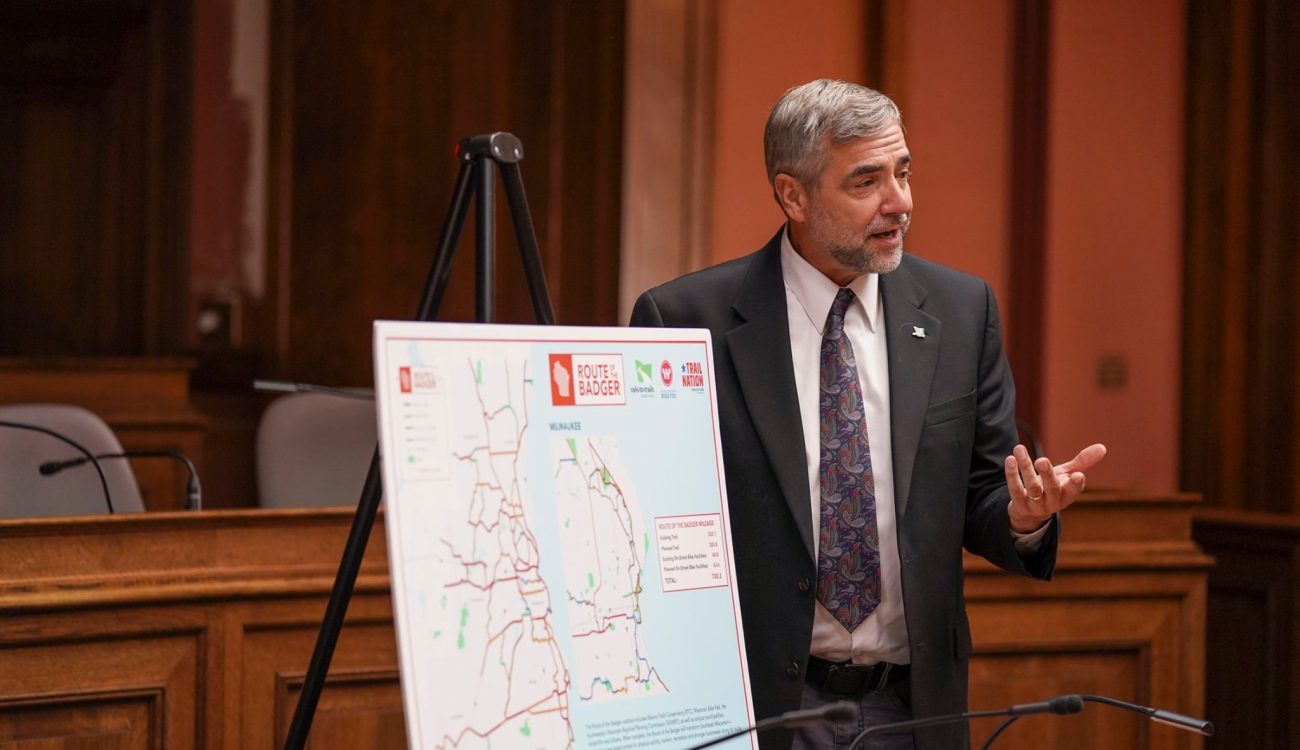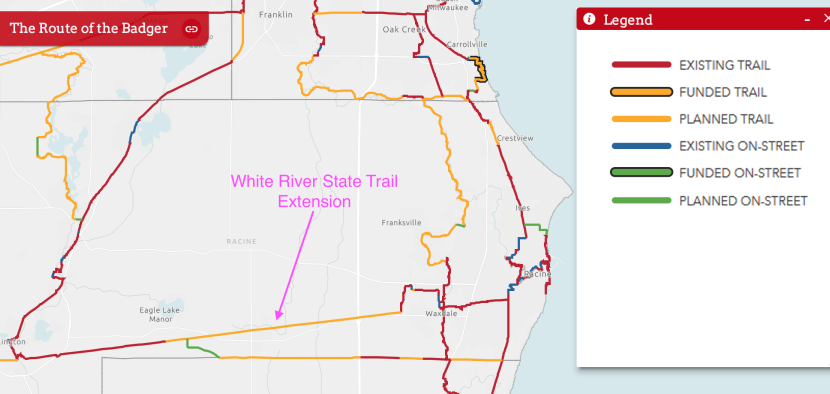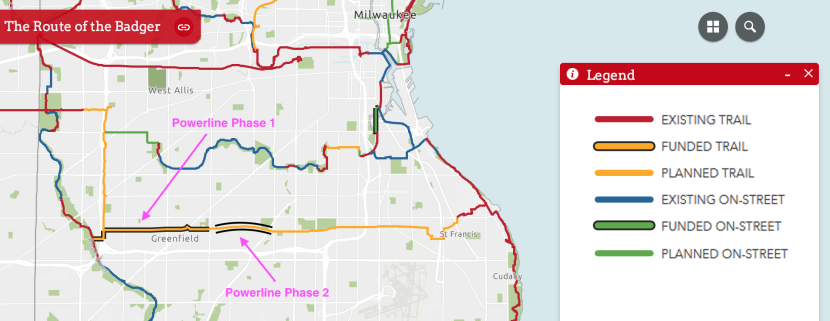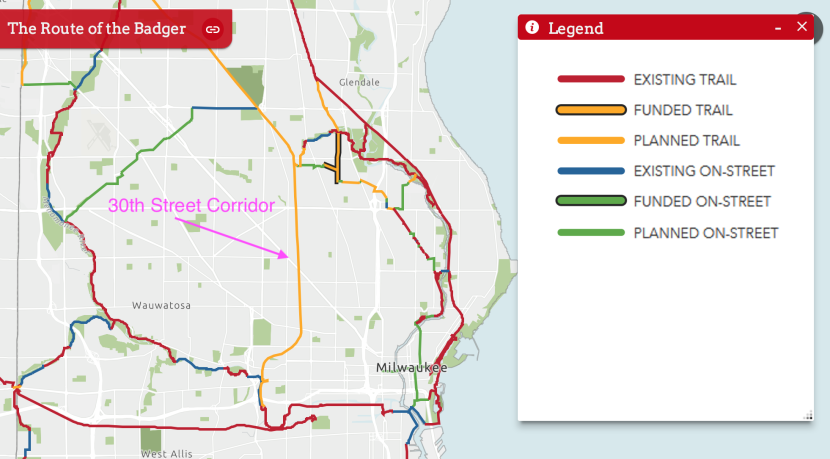
New Trails on the Horizon
Featured article from Bike Fed’s 2022 Ride Guide magazine, with updated details on Greenfield’s Powerline Trail
By Willie Karidis, Rails to Trails Project Manager, Route of the Badger
“As a kid, I had a dream – I wanted to own my own bicycle. When I got the bike, I must have been the happiest boy in Liverpool, maybe the world. I lived for that bike. Most kids left their bike in the backyard at night. Not me. I insisted on taking mine indoors and the first night I even kept it in my bed.” ~ John Lennon, The Beatles
I have to admit that never, not once, did I take my bike to bed with me. However, my memories as a kid growing up riding my bike on the streets and sidewalks on the south side of Milwaukee were deeply formative, nonetheless. My first taste of freedom, independence, and adventure all happened because I was fortunate to have a bike. The fearlessness of youth was normal, and we created our own trails where there were none. My time on a bike and the lessons learned while exploring set the foundation for all my future travels and wanderlust for discovery that eventually took me to live in Alaska and work with the Iditarod.
I did eventually return to my hometown of Milwaukee and have spent the last five years working for the Rails-to-Trails Conservancy (RTC) on the Route of the Badger project. The list of amazing people I work with is long and the trail plans are ambitious. And what all of those people and their very different local projects have in common are a few simple but profound goals and realizations.
Willie Karidis, Rails to trails “route of the badger” project manager
First, we all share a desire to create more and better access for people to get outside. We share the belief that the easier we can make it for people to have great experiences outside, the better it is for our communities. Second, we realize that finding creative solutions to the complicated problem of building a connected network of trails between so many communities is worth all the valuable time and resources it takes to achieve that goal. Finally, building trail infrastructure and that network is complex and requires a commitment we must sustain, even after that initial longer desire for a new trail fades.
With these three realizations as a backdrop reflection, I feel that 2021 was a good year that kindles hope for future projects within the Route of the Badger network.
This past May, the Wisconsin Department of Natural Resources finalized a deal with Canadian Pacific Railroad to purchase a 10.7 miles corridor that will become an extension to the White River State Trail. The complexity of the deal for this corridor took several years and was challenging due to many unforeseen circumstances, but the champion negotiators from the DNR never gave up. The result of their tenacity will benefit future trail users for generations to come. Now the planning, engineering, and construction of the trail need to happen so people can enjoy the fruits of this long-term vision.

Another highlight was the City of Greenfield’s successful applications for federal Congestion Mitigation and Air Quality (CMAQ) grants for the first two phases of the “Powerline Trail.” Phase 1 will include a connection to the Oak Leaf Trail and travel 3 miles east under, you guessed it, the WE Energies power line running approximately between W Plainfield Ave and Waterford Ave. Phase 2 of the project received another CMAQ grant and will extend from the end of Phase 1 on 60th Street east to 35th Street. When completed, the Powerline Trail will be a nine-mile trail connecting the Oak Leaf Trail on the west all the way to Lake Michigan. For all of this to happen Greenfield had to step up and apply for the grant and take on the everyday maintenance work once the trail is built. But the first hurdle was the land acquisition or, in this case, permission for use of the right of way. Step in WE Energies; not only are they willing partners, they are leading the way nationally in terms of energy providers providing easements for trails’ right of ways.

Another significant accomplishment on the long journey to building a trail along the 30th Street Corridor on the north side of Milwaukee was the attainment of $200,000 by RTC through the Catena Foundation for the development of an Equitable Development Planning Process. The majority of these dollars will be passed through to local nonprofit partners who are doing community outreach along the Corridor.

We are still far from having a trail built in the 30th Street Corridor; the most significant barrier is the purchase of the railroad corridor. While significant steps are being taken to move the needle forward, the future outcome is far from determined. All we can do is make the case, engage with the community, and continue to believe in a world-class “rail with trail” that will connect all of Milwaukee together.
The partnership with the Wisconsin Bike Fed provided a foundational entryway for RTC to begin work on the Route of the Badger. We are truly appreciative of their belief and support over all these years. Together we can and will make significant progress in adding to the trail infrastructure of southeast Wisconsin.